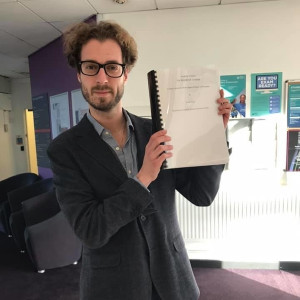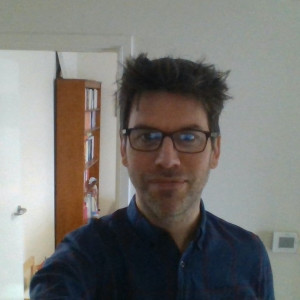Almost humorous, isn’t it? People who spend their education looking at the past have to, at some point, look to the future.

The study of history, in effect, gets more complicated over time. Suddenly we have to consider what is relevant in society and what can be cast to the pages of… erm, history. It is not simply a look at what we consider to be fact, for there are many different interpretations of past events to look at. To quote George Orwell, “He who controls the present, controls the past. He who controls the past, controls the future.” Perhaps unsurprisingly, the legendary phrase “History is written by the victors” is generally attributed to Winston Churchill. There is so much to history and so many perspectives to use – it can become a confusing subject of contradictions and what you choose to believe to be fact can depend on a variety of things, ranging from your political views to your sense of morals. The most polarising figures in modern history are those who’s legacy depends on such human debate, the views of people and even the rejection of ‘common knowledge.’ It is perhaps for this reason that history students can be considered highly philosophical individuals – they can dissect different pieces of information and consider its true value. Reliability and the eventual adoption or rejection of an idea are closely linked and this type of analytical mind can be highly prized by employers. It’s not just an analysis of data that will be appreciated, it’s also the carefully consideration of what is important and what can be considered less-relevant. There are no shortage of reasons as to why History students and graduates are in such demand:
- Critical analysis – As I’ve mentioned, sometimes trawling through data or information is the key to getting a project done. As many economists will tell you, sometimes it’s handy if you don’t have to look through everything out there. Being able to do things efficiently and only look at what is necessary is something that saves a business time and money. An employer will love it if you keep focussed on what’s important. Did you know that Bill Gates once said he loved programmers who were ‘lazy’? They always found the easiest way to get the job done. In the world of programming, that saved him a fortune. In some ways you can apply this to analysis. Not to say you have to be lazy, but if you can easily cut out what you don’t need, you’ll be more effective.
- Research – sometimes you need to collect the information yourself and history is one of the stereotypical research subjects. The idea of poring over old books and internet scannings of texts will probably suit an employer who has a huge research task to complete. It’s no secret that examining and evaluating sources of information has been a history thing. For some reason, history students have a lot of patience when it comes to looking for the correct information to use. Ultimately, a bit of patience goes a long way and allows you keep on track of work. An employer who wants someone to sit down for weeks and possibly months on end, trawling through information of different formats will love a history student.
- Sociological skills – This is perhaps a little unusual. A historical analysis of society is actually a rather interesting idea and it is one that historians are rather good at. Over time, the attitudes of people has altered society, meaning that the way that we operate as people and groups of people has forever changed. Being able to look at this is something that forecasters will actually appreciate, believe it or not. Looking at how things have changed over many years could be of use to commentators and forecasters, especially when looking at different trends in society.
According to the Higher Education Careers Services Unit (HECSU) there were close to 11,000 graduates in History last year. What happened to all of them?
- 39.1% of them went into a full-time job within 6 months.
- 21.6% went into further education or training. Of that, nearly 57% went off to do a Masters Degree and just over 15% went to do a PGCE (the most-common route into teaching.) The Masters students predominantly went into History again for a Masters of Doctorate, but a couple also ventured into politics too.
- The unemployment rate after six months stood at 8.6%, though this includes those who were waiting to start a job they had already secured.
So, where exactly could you find yourself with a degree in history?
Museums
OK, so perhaps it’s a little stereotypical of me to say so. However, there are many different areas of working in a museum or other area of historical significance that could suit you…
- Archivists are highly-trusted people who look after items and documents of high significance to people. This often includes looking after and maintaining older pieces of historical text or books, for example. It could mean managing collections and potentially working with donors to secure funds for restoration. If that doesn’t get your proud history background fired up, I’m not sure what will!
- Similarly, you could find yourself in a heritage-type role, preserving and managing a site of particular importance. Such sites are becoming a sad rarity today and so having a well-organised and enthusiastic person in charge will definitely help the cause of the site.
- On a similar note again, you could find yourself in an engagement-type role, helping people to become more educated in culture. No doubt the odd school trip might have told you something about a particular place that you visited. Working to ensure that people become more aware of different places is arguably key to our heritage.
Research
If you’ve spent three years poring over books of historical significance, the likelihood is that you like what you do. Looking through different texts could well suit someone who has an interest in markets. Working in research for a marketing company could almost certainly be your thing, especially if you enjoy looking at modern history and some of the more exciting aspects of modern society. You could find that if your university modules included the period after the Second World War, a marketing firm might be interested in your more modern approach to history and so it could help shape their marketing ideas, especially if you’ve looked at the sociological side.
The Blackboard?
We can never underestimate the importance of having people to inspire future generations of teaching. It would appear that I’m not too far off in my opinion there – people going onto the PGCE course is most definitely a viable option for many graduates. Teaching history at a secondary level could well be a rewarding career.
For those students out there who haven’t yet graduated, there might still be a good option for you in the meantime to get started – history online tutoring. Related articles:
















